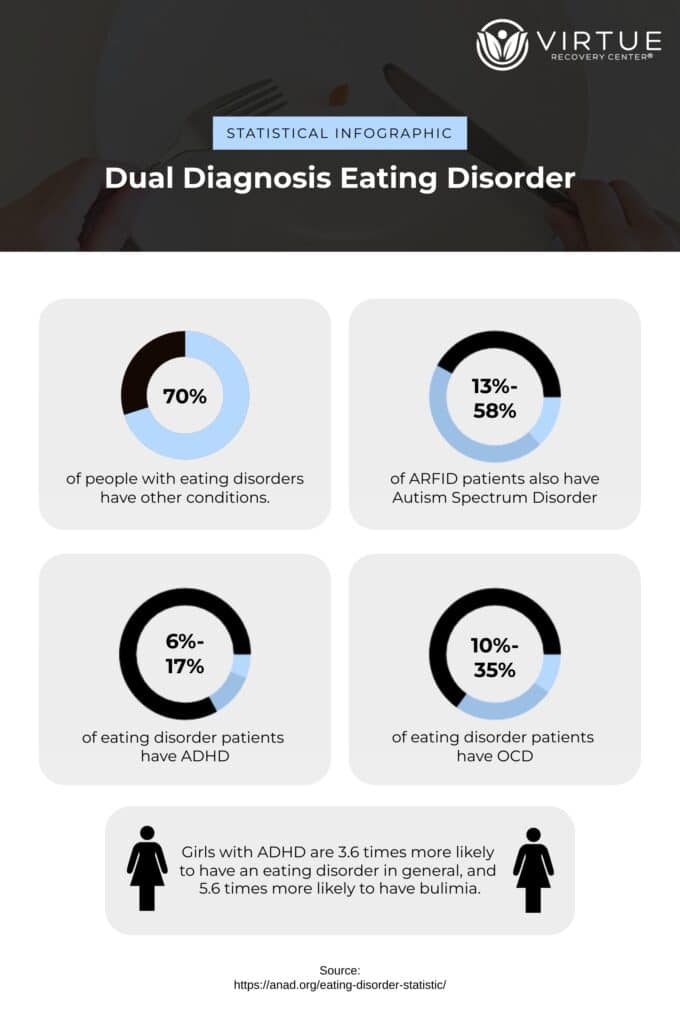What if the very thing you’re using to cope is making everything worse? For many people struggling with eating disorders, the answer is heartbreaking: substance abuse. These two issues don’t just show up together—they fuel each other, creating a dangerous cycle that’s hard to break. Over 70% of those with eating disorders also face different mental health challenges, often leading to substance use as a way to escape. But there’s hope. Specialized dual diagnosis treatment can help you regain control and find lasting recovery by addressing both issues head-on, giving you the support you deserve.
Key Takeaways:
- Eating disorders and substance abuse frequently occur together, making dual diagnosis treatment essential for recovery.
- More than 70% of people with eating disorders also struggle with other mental health disorders, most commonly anxiety and mood disorders.
- When left untreated, substance use disorder and eating disorders can feed into each other, creating a cycle that worsens both.
- Specialized dual diagnosis treatment can help individuals manage these co-occurring disorders and achieve long-term recovery.
- Seeking professional help at a treatment center focusing on dual diagnoses ensures comprehensive care for both conditions.
Introduction
Eating disorders and substance abuse are complex disorders that often go hand in hand. Many people who struggle with an eating disorder may also turn to substance use as a way to cope with their emotions, manage body image, or handle the stress of daily life. This combination can create a dangerous cycle where both the eating disorder and substance use disorder fuel each other, making it harder for individuals to recover.
Over 70% of people with eating disorders also have at least one other mental health condition, such as anxiety, depression, or mood disorders. For this reason, it’s essential to address both issues simultaneously through dual diagnosis treatment. Without treating both the eating disorder and the substance abuse together, long-term recovery becomes difficult.
What is Dual Diagnosis?
A dual diagnosis means that someone is dealing with two or more disorders at the same time, such as an eating disorder and a substance use disorder. These conditions don’t just exist side by side—they often interact and worsen each other.
For example, someone with anorexia nervosa may use substances like alcohol or drugs to suppress their appetite. At the same time, a person with binge eating disorder might turn to substances as a way to cope with feelings of shame or guilt. Treating one condition without addressing the other can leave individuals at risk for relapse or worsening symptoms.
Dual diagnosis treatment is critical because it looks at the whole person rather than just one condition. This approach ensures that both the mental health disorder and the substance abuse are treated together for the best chances of recovery.
Why Eating Disorders and Substance Abuse Often Go Together
There are many reasons why eating disorders and substance abuse frequently co-occur. One key factor is that both are often used as coping mechanisms for deeper emotional issues such as anxiety, depression, or stress. When someone struggles with negative body image or overwhelming emotions, turning to substances or controlling their eating may feel like a way to gain control or escape from pain.
Research shows that people with eating disorders typically have between one and four other psychiatric conditions. For example, the majority of adolescents with eating disorders also have at least one other psychiatric disorder, ranging from 55% for anorexia to 88% for bulimia. These individuals may use substances to manage these co-occurring issues, such as using drugs to reduce anxiety or alcohol to numb emotional pain.
In some cases, physical health conditions can also increase the risk of eating disorders and substance abuse. For instance, people with disabilities may have body image concerns related to their physical appearance, which can lead to both eating disorders and substance use. Women with specific physical disabilities are more likely to develop eating disorder behaviors.
Types of Eating Disorders and Their Connection to Substance Abuse
Anorexia nervosa, bulimia nervosa, and binge eating disorder are the most common types of eating disorders, and each one has its unique connection to substance abuse. Here’s a closer look at how these disorders are linked:
- Anorexia Nervosa: People with anorexia restrict their food intake to lose weight, often to dangerous levels. Many may use substances like stimulants or alcohol to help suppress their appetite or reduce the anxiety they feel about eating.
- Bulimia Nervosa: This eating disorder involves cycles of bingeing and purging. Some individuals with bulimia use substances such as laxatives, diuretics, or alcohol to enhance purging behaviors. There is also a strong link between bulimia and alcohol abuse, as alcohol is sometimes used to dull the emotional stress that triggers bingeing.
- Binge Eating Disorder: People with binge eating disorder consume large amounts of food in a short period and often feel out of control during these episodes. Substances like alcohol or drugs may be used to cope with the guilt and shame that follows bingeing.
Studies have shown that people with type 1 diabetes are also at a higher risk for disordered eating behaviors. In one long-term study of girls with type 1 diabetes, it was found that by the time they reached their 20s, 40.8% met criteria for a complete or sub-threshold eating disorder. These individuals are at higher risk for serious health complications, including ketoacidosis and retinopathy.
The Impact of Co-Occurring Disorders on Recovery
When eating disorders and substance abuse are present together, they can make recovery much more challenging. One reason for this is that the behaviors involved in eating disorders can reinforce the behaviors engaged in substance use and vice versa.
For example, someone struggling with anorexia nervosa might use stimulants or drugs to suppress their appetite, which worsens their physical health. On the other hand, someone dealing with a binge eating disorder might use alcohol to numb feelings of guilt, but alcohol use can trigger further binges.
In many cases, people with eating disorders and substance use disorders have been dealing with these issues for years before they seek treatment. This makes it even more critical to address both problems simultaneously through dual diagnosis treatment. If only one disorder is treated, the other can continue to cause harm and lead to relapse.
How Dual Diagnosis Integrated Treatment Works
A successful dual diagnosis treatment program focuses on addressing both the eating disorder and the substance use disorder simultaneously. This approach is crucial because treating one condition without the other often leads to incomplete recovery and an increased risk of relapse.
Integrated treatment programs combine medical care, therapy, and support for both conditions. For example, someone with anorexia and substance abuse may work with a medical team to stabilize their physical health and then participate in therapy to address the emotional triggers behind both their eating disorder and their substance use.
Therapies commonly used in dual diagnosis treatment include Cognitive Behavioral Therapy (CBT), dialectical behavior therapy (DBT), and nutritional counseling. These therapies help individuals learn healthier coping mechanisms and break the cycle of harmful behaviors.
Dual diagnosis treatment centers also offer a supportive environment where individuals can connect with others experiencing similar struggles. This sense of community can be essential for people who feel isolated by their disorders.

Conclusion
The link between eating disorders and substance abuse is strong, and treating both conditions at the same time is essential for lasting recovery. Whether it’s anorexia nervosa, bulimia, or binge eating disorder, individuals with these conditions often face additional challenges from substance use disorders.
If you or someone you know is struggling with both an eating disorder and substance abuse, it’s essential to seek help from professionals who specialize in dual diagnosis treatment. At Virtue Recovery Las Vegas, our dedicated team provides the support and treatment needed to address both issues. Call us today at 866-520-2861 to learn how we can help you or your loved one recover.
FAQs for Co-Occurring Eating Disorder & Substance Use Disorder
What is dual diagnosis for eating disorders and substance abuse?
Dual diagnosis means treating both an eating disorder and a substance use disorder at the same time. These conditions are often connected, so addressing both is critical for long-term recovery.
Why do eating disorders and substance abuse often occur together?
People with eating disorders often use substances to manage their emotions, anxiety, or body image. Substances like alcohol and drugs can temporarily numb emotional pain, but they also worsen the eating disorder.
What types of eating disorders are linked to substance abuse?
Common eating disorders like anorexia nervosa, bulimia, and binge eating disorder are all linked to substance use disorders. Each disorder may involve different substances, such as stimulants, alcohol, or drugs.
How does dual diagnosis treatment work?
Dual diagnosis treatment focuses on addressing both the eating disorder and substance use disorder together. This integrated approach includes medical care, therapy, and ongoing support to help individuals recover from both conditions.
How can Virtue Recovery Las Vegas help with dual diagnosis?
At Virtue Recovery Las Vegas, we offer specialized dual diagnosis treatment for individuals dealing with both eating disorders and substance abuse. Our programs are designed to treat both conditions simultaneously for a better chance of recovery. Call us at 866-520-2861 to learn more.
What disorder might be commonly comorbid with an eating disorder?
Anxiety disorders are commonly comorbid with eating disorders, with over 70% of people with eating disorders also experiencing anxiety or mood disorders. Treating both conditions simultaneously is critical for successful recovery.
What other disorder is closely linked to eating disorders?
Substance use disorders may often occur alongside eating disorders, as individuals may use alcohol or drugs to cope with body image issues or emotional stress. Co-occurring treatment addresses both disorders to help achieve long-term recovery.
Is there a cure for dual diagnosis?
There is no single cure for dual diagnosis. Still, comprehensive treatment options such as therapy, medication, and a tailored treatment plan can help manage both conditions and lead to successful treatment and recovery.
What medication is used for dual diagnosis?
Medications like antidepressants or anti-anxiety drugs are often used in the treatment plan for dual diagnosis to address anxiety disorders or mood disorders that co-occur with eating disorders and substance abuse issues.
What are eating disorders influenced by?
Eating disorders are influenced by factors such as stress, body image concerns, and emotional regulation issues. Effective treatment for eating disorders includes addressing these underlying issues with therapy and medical support.
Which factor has been linked to the development of eating disorders?
Chronic stress and trauma have been linked to the development of eating disorders, often triggering a reliance on unhealthy coping mechanisms such as substance abuse and addiction. Dual diagnosis treatment addresses both stress disorder and substance use issues.
What mental health condition might correlate with an eating disorder?
Anxiety disorders frequently correlate with eating disorders, and both conditions need to be treated in a co-occurring treatment program for the best chance at recovery.
Is it possible to have 2 eating disorders?
Yes, it is possible to have more than one eating disorder at the same time, such as a combination of anorexia nervosa and bulimia. Treating these co-occurring eating disorders requires a specialized and integrated treatment plan.
Resources
https://anad.org/eating-disorder-statistic/
https://nedc.com.au/eating-disorders/types/co-occurring-conditions









